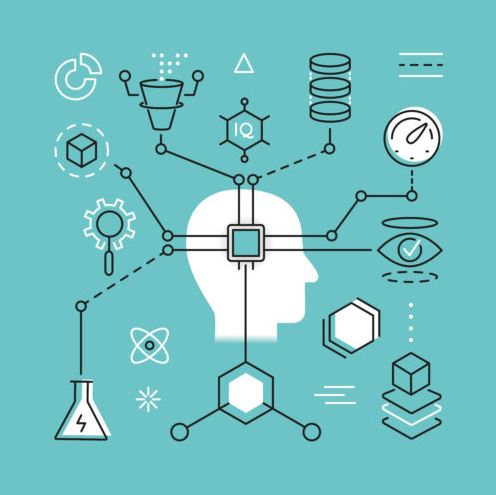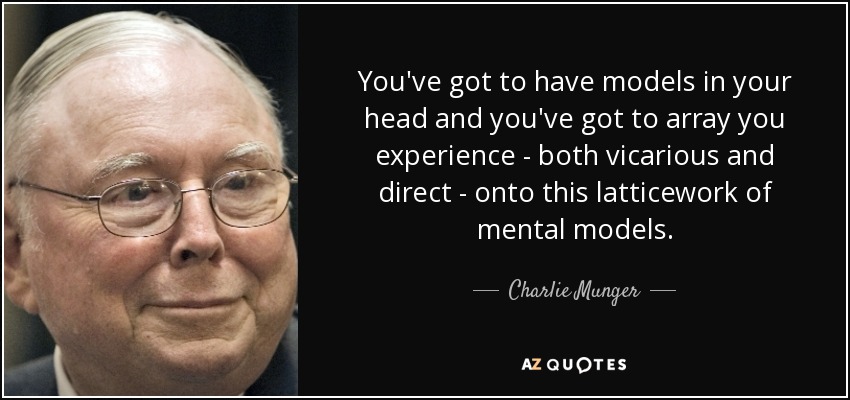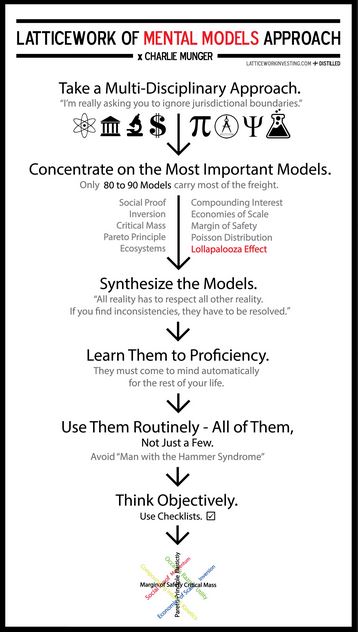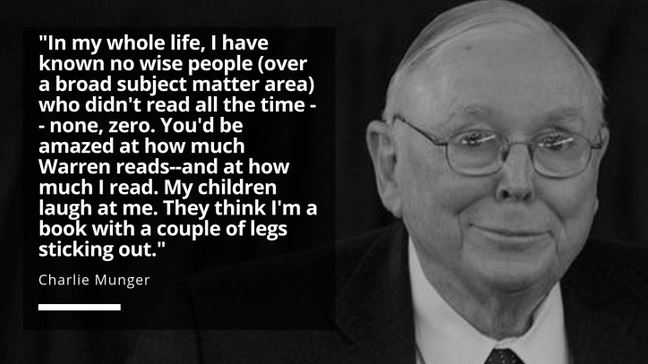Mental Models
Mental Models Help You Think Effectively
A Mental Model Is A High Level Overview Of How Something Works

Mental Models - Overview
Mental models are high level representations of how thing work.
They help you think effectively and thus are fully aligned with the objectives and purpose of this site.
According to Charlie Munger:
Munger is referring here to mental models.
Two broad categories of mental models that are particularly useful are those that help us understand how:
[1] The world works and thus to predict the future.
[2] To see connections and opportunities
Our world is multi-dimensional and our problems are complex. Most problems cannot be solved using one model alone, thus it follows that the more models you have in the toolkit, the better equipped you will be to solve your problems because you can look at the problem from a variety of perspectives and increase the odds that you will come to a better solution.
But if you don’t have the models, you become the proverbial man with a hammer to whom every problem looks like a nail.
Another important
consideration is how you prioritise your learning. Trying to keep
up-to-date with all the latest information will lead to us chasing our
tails, therefore Charlie Munger says that we should focus on things that
change slowly:
Latticework Of Mental Models

Since it is impossible to keep all of the details of all of the information that you absorb in your brain, you use models to simplify the complex into understandable and organisable chunks.
Mental models shape how you reason and how you understand, and they also shape the connections and opportunities that you see, and also why you consider some things more relevant than others.
The quality of your thinking processes is proportional to the models in your head and their applicability to the situation under consideration.
The more models you have the better quality will be your thinking processes and decision making ability, however most people are specialists.
- Many people know a little about a little.
- Most people with training and skills in a particular discipline or scope of proficiency know a lot about a little.
- The person with a latticework of mental models knows a little about a lot.
- The serious thinker has a latticework of mental models that enable him/her to know a lot about a lot.
“You don’t have to know everything. A few really big ideas carry most of the freight.”
"It’s kind of fun to sit there and out-think people who are way smarter than you are because you’ve trained yourself to be more objective and more multidisciplinary. Furthermore, there is a lot of money in it, as I can testify from my own personal experience."

Charlie Munger: Adding Mental Tools to Your Toolbox
How To Prioritise Learning Mental Models

- Get back to basics. Understanding a simple idea deeply, creates more lasting knowledge and builds a solid foundation for complex ideas later.
- Build your foundation. Take the time to do a Feynman One Pager on an idea you think you know really well. While easy, this process will reveal any gaps you have in your knowledge.
- The multidisciplinary mind understands the basic ideas. You don’t need to understand the latest study in biology, but you sure as heck better understand the concept of evolution because it applies to so much more than animals.
- Understanding the basics allows us to predict what matters. Put simply, people who understand the basics are better at understanding second and subsequent order consequences.
- What has been will continue to be. The longer a technology lives, the longer it can be expected to live.
- Time can predict value. While produce and humans have a mathematical life expectancy that decreases with each day, some things, like books, increase in life expectancy with each passing day.
Further reading:
In the words of Charlie Munger:
How Do Mental Models Align With The Themes Of This Site?
The purpose of this site is to show you how to cope in tough times, and to provide you with the tools to do this successfully. Mental models are an integral part of all this. Here is how it all hangs together.
FULL LISTING - Mental Models
Mental Models: The Best Way to Make Intelligent Decisions (109 Models Explained)
Reflections and Action Points
Reflections
What basic mental models do I already have?
- The article argues that mental models are “high-level representations of how things work.”
- Which of these models do you habitually use (e.g., first principles, inversion, Pareto)? Which feel shaky or undeveloped?
- How often do you notice yourself using a “one model only” approach (the hammer-nail trap)?
Where are my blind spots?
- The piece says: “What we need is a latticework of mental models spanning many different domains of information and experience.”
- In which domains (systems, numeracy, human nature, productive thinking) do you feel under-equipped?
- Are there areas in your personal or professional life where your thinking keeps falling into recurring mistakes or biases?
How deeply do I understand the ‘basics’?
- The article quotes: “Understanding a simple idea deeply … builds a solid foundation for complex ideas later.”
- Which “basic ideas” relevant to you (e.g., compounding, leverage, feedback loops) might benefit from deeper study?
- How often do you stop to teach (or self-teach) a simple idea to yourself, to expose gaps?
How am I using models to manage complexity and change?
- From the article: “The more models you have … the better quality will be your thinking processes and decision-making ability.”
- When you face a complex or new problem, do you default to a single mental model?
- Or do you consciously vary approaches? How do you react when the world changes and the old model starts to mis‐predict?
How aligned are these ideas with your personal mission (e.g., clarity, thought-awareness)?
- The article states: “The purpose of this site is to show you how to cope in tough times … Mental models are an integral part of all this.”
- How might building stronger mental models support your goal of “thought-awareness” and mental clarity?
- Are there specific models that map directly onto what you’re seeking (e.g., noticing underlying thought patterns, seeing system dynamics)?
Action Points
Create a “mental-model audit” list
- Make a list (on paper or digitally) of 8-10 mental models you know (or know of) and assign your confidence level (e.g., 1 = barely know it; 5 = comfortable applying it).
- Mark 1-2 models where your confidence is low (e.g., “second order thinking”, “inversion”) and commit to one short learning session this week just on that model.
Teach a basic model in one page (Feynman style)
- Choose a model you think you know well. Write a one-page explanation in simple language (as you might teach someone with no background).
- In the process, look for gaps or fuzzy areas in your understanding (as the article recommends).
- After doing that, consider: how would that model apply to one decision you face in the next week?
Apply “two-model thinking” to a real decision
- Pick a decision you will face in the next week (work, life, or project).
- Choose two distinct mental models from different domains (for example: “leverage” from systems thinking + “confirmation bias” from human nature).
- Map out how each model helps you see the decision differently.
- Then check: did one model dominate? What insights emerged by forcing yourself to use two?
Build a “model swap” habit
- Whenever you catch yourself solving a problem with your “go-to” approach, pause and ask: “What model am I using? What alternative model could I switch to?”
- For example: if you’re thinking “I just must push harder” that’s maybe a brute-force model. Could you try a “leverage” or “feedback loop” model instead?
- Track once a day (in a journal) when you successfully swapped models and what changed.
Mental Models - Resources On This Site
Mental Models - General Thinking Concepts
The Power Of Opposite Thinking
Iatrogenics - "Do Something Syndrome"
How To Make Better Decisions - By Avoiding The Narrative Trap
The Metagame Approach to Second-Order Thinking - 5 Guiding Principles
What Is Truth - How To Tell A Partial Truth From The Whole Truth?
Mental Models - Human Nature
Why You Should Embrace Anomalies
Why Absence Feels Like Rejection
Mental Models - Productive Thinking
Applied Rationality and The Scout Mindset
Less Is More - Subtractive Solutions
The Challenges Of The Road Less Traveled
Discernment - Exercising Good Judgement
How To Make Better Decisions - By Avoiding The Narrative Trap
The ETTO Principle - Why Near Enough Can Be Good Enough
Outcome Over Optics - Long Game Outcomes Over Short-Term Ego Gains
Mental Models - Physics, Chemistry & Biology
Mental Models - Systems
Mental Models - Numeracy
Food For Thought: Using Models to Stay Calm in Charged Situations
Return from "Mental Models" to: How To Think
LATEST ARTICLES
Does Prayer Work? The Psychology of Prayer, Meditation and Outcomes
 Reality Is A Complex System Of Countless Interactions - Including Yours. So does prayer work? The problem is that the question itself is usually framed in a way that guarantees confusion. We tend to a…
Reality Is A Complex System Of Countless Interactions - Including Yours. So does prayer work? The problem is that the question itself is usually framed in a way that guarantees confusion. We tend to a…Living in Survival Mode Without Surrendering Mental Authority
Living in Survival Mode Without Surrendering Mental Authority
 Clear Thinking When You’re Just Trying to Stay Afloat. Many people today are overwhelmed because they are living in survival mode - not temporarily, but as a persistent condition of life. For many, th…
Clear Thinking When You’re Just Trying to Stay Afloat. Many people today are overwhelmed because they are living in survival mode - not temporarily, but as a persistent condition of life. For many, th…Manifestation Without Magic: A Practical Model
 Manifestation without magic is not a softer or more intellectual version of popular manifestation culture. It is a different model altogether. Popular manifestation teachings tend to frame reality as…
Manifestation without magic is not a softer or more intellectual version of popular manifestation culture. It is a different model altogether. Popular manifestation teachings tend to frame reality as…Staying Committed When You Can't See Progress - The Psychology of Grit
 Uncertainty Is Not The Absence Of Progress, Only The Absence Of Reassurance. One of the most destabilising experiences in modern life is not failure, but uncertainty and staying committed when you can…
Uncertainty Is Not The Absence Of Progress, Only The Absence Of Reassurance. One of the most destabilising experiences in modern life is not failure, but uncertainty and staying committed when you can…The Battle For Your Mind - How To Win Inner Freedom In A Digital Age Of Distraction
 From External Events to Inner Events. We often think of “events” as things that happen out there: the traffic jam, the rude comment, the delayed email reply. But what truly shapes our experience is wh…
From External Events to Inner Events. We often think of “events” as things that happen out there: the traffic jam, the rude comment, the delayed email reply. But what truly shapes our experience is wh…How to See Your Thoughts Without Becoming the Story
 A Practical Guide to Thought-Awareness. You can spend your life inside the stories of your mind without ever learning how to see your thoughts clearly and objectively. Most of the stuff we tell oursel…
A Practical Guide to Thought-Awareness. You can spend your life inside the stories of your mind without ever learning how to see your thoughts clearly and objectively. Most of the stuff we tell oursel…The Collison Decision Matrix - A Simple Framework for Better Choices
 The Collison Decision Matrix Is A Practical Everyday Thinking Tool. Most of us spend a surprising amount of time worrying about decisions. From small ones such as what to wear, what to eat, what to te…
The Collison Decision Matrix Is A Practical Everyday Thinking Tool. Most of us spend a surprising amount of time worrying about decisions. From small ones such as what to wear, what to eat, what to te…The Power Of Asking The Right Question
 The Power Of Asking The Right Question Lies In The Quest For Insight. To experience the power of asking the right question you must develop the practice of asking questions. The best way to improve th…
The Power Of Asking The Right Question Lies In The Quest For Insight. To experience the power of asking the right question you must develop the practice of asking questions. The best way to improve th…Site Pathways
 Here is a site pathway to help new readers of Zen-Tools navigate the material on this site. Each pathway is based around one of the many key themes covered on this site and contain a 150 word introduc…
Here is a site pathway to help new readers of Zen-Tools navigate the material on this site. Each pathway is based around one of the many key themes covered on this site and contain a 150 word introduc…How To Live With Contradiction - Beyond Thought Let Stillness Speak
 A major impact on so many peoples' lives is the situational contradiction of unfilled realistic expectations. So where does all this leave us? Well here we are, with mental equipment that is more lim…
A major impact on so many peoples' lives is the situational contradiction of unfilled realistic expectations. So where does all this leave us? Well here we are, with mental equipment that is more lim…How To Trust The Process Of Mindfulness - Right Now
 In mindfulness, the process isn’t some distant goal — it's what is happening right now. When we talk about how to trust the process of mindfulness the credibility of the process is heavily dependent…
In mindfulness, the process isn’t some distant goal — it's what is happening right now. When we talk about how to trust the process of mindfulness the credibility of the process is heavily dependent…